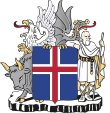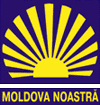 |
|---|
Iceland has a multi-party system with many political parties, in which often no one party has a chance of gaining power alone, and parties must work with each other to form coalition governments.
 |
|---|
Iceland has a multi-party system with many political parties, in which often no one party has a chance of gaining power alone, and parties must work with each other to form coalition governments.
Eight parties were elected at the September 2021 election. The box below shows the distribution of seats in the incumbent parliament.
| Party [1] | Ideology | Election symbol [2] | ||
|---|---|---|---|---|
| Freedom Party Frelsisflokkurinn | Right-wing nationalism | Þ | ||
| | Humanist Party Húmanistaflokkurinn | Humanism | H | |
| Icelandic National Front Íslenska þjóðfylkingin | Right-wing populism | E | ||
| | People's Front of Iceland Alþýðufylkingin | Anti-capitalism | R | |
| | Icelandic Socialist Party Sósíalistaflokkur Íslands | Socialism | J | |
| | Liberal Democratic Party Frjálslyndi lýðræðisflokkurinn | Classical liberalism | O | |
| Responsible Future Ábyrg framtíð | Anti-vaccinationism | Y | ||
In politics, a red–green alliance or red–green coalition is an alliance of "red" parties with "green" parties. The alliance is often based on common left political views, especially a shared distrust of corporate or capitalist institutions. While the "red" social-democratic parties tend to focus on the effects of capitalism on the working class, the "green" environmentalist parties tend to focus on the environmental effects of capitalism.

The Independence Party is a conservative political party in Iceland. It is currently the largest party in the Alþingi, with 17 seats. The chairman of the party is Bjarni Benediktsson and the vice chairman of the party is Þórdís Kolbrún R. Gylfadóttir.

The Social Democratic Alliance is a social-democratic political party in Iceland. The party is positioned on the centre-left of the political spectrum and their leader is Kristrún Frostadóttir.

The Progressive Party is an agrarian political party in Iceland.

The Left-Green Movement, also known by its short-form name Vinstri græn (VG), is an eco-socialist political party in Iceland.
An electoral alliance is an association of political parties or individuals that exists solely to stand in elections.

The Our Moldova Alliance was a social-liberal political party in Moldova led by Serafim Urechean, former mayor of Chișinău. It merged into the Liberal Democratic Party of Moldova (PLDM) during April 2011.
This article gives information on liberalism worldwide. It is an overview of parties that adhere to some form of liberalism and is therefore a list of liberal parties around the world.

The Union of Democratic Forces is a political party in Bulgaria, founded in 1989 as a union of several political organizations in opposition to the communist government. The Union was transformed into a single unified party with the same name. The SDS is a member of the European People's Party (EPP). In the 1990s the party had the largest membership in the country, with one million members, but has since splintered into a number of small parties totaling no more than 40,000 members. The SDS proper had 12,000 members in 2016.
Snap parliamentary elections were held in Iceland on 25 April 2009, following strong pressure from the public as a result of the Icelandic financial crisis. The Social Democratic Alliance and the Left-Green Movement, which formed the outgoing coalition government under Prime Minister Jóhanna Sigurðardóttir, both made gains and formed an overall majority of seats in the Althing. The Progressive Party also made gains, and the new Citizens' Movement, formed after the January 2009 protests, gained four seats. The big loser was the Independence Party, which had been in power for 18 years until January 2009: it lost a third of its support and nine seats in the Althing.

Parliamentary elections were held in Iceland on 27 April 2013. Fifteen parties contested the elections, compared to just seven in the previous elections. The result was a victory for the two centre-right opposition parties, the Independence Party and Progressive Party, which subsequently formed a coalition government. The parties were eurosceptic and their win brought to a halt partially completed negotiations with the European Union regarding Icelandic membership.